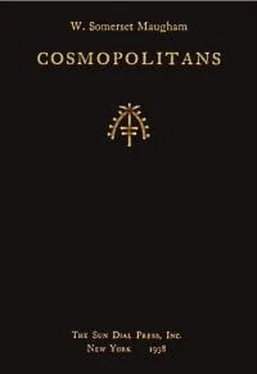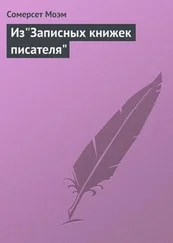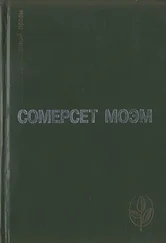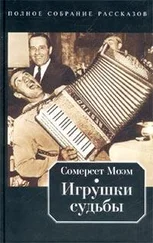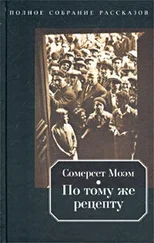Уильям Моэм - Cosmopolitans
Здесь есть возможность читать онлайн «Уильям Моэм - Cosmopolitans» весь текст электронной книги совершенно бесплатно (целиком полную версию без сокращений). В некоторых случаях можно слушать аудио, скачать через торрент в формате fb2 и присутствует краткое содержание. Город: New York, Год выпуска: 1938, Издательство: The Sun Dial Press, INC., Жанр: Классическая проза, short_story, на английском языке. Описание произведения, (предисловие) а так же отзывы посетителей доступны на портале библиотеки ЛибКат.
- Название:Cosmopolitans
- Автор:
- Издательство:The Sun Dial Press, INC.
- Жанр:
- Год:1938
- Город:New York
- ISBN:нет данных
- Рейтинг книги:5 / 5. Голосов: 1
-
Избранное:Добавить в избранное
- Отзывы:
-
Ваша оценка:
- 100
- 1
- 2
- 3
- 4
- 5
Cosmopolitans: краткое содержание, описание и аннотация
Предлагаем к чтению аннотацию, описание, краткое содержание или предисловие (зависит от того, что написал сам автор книги «Cosmopolitans»). Если вы не нашли необходимую информацию о книге — напишите в комментариях, мы постараемся отыскать её.
Cosmopolitans — читать онлайн бесплатно полную книгу (весь текст) целиком
Ниже представлен текст книги, разбитый по страницам. Система сохранения места последней прочитанной страницы, позволяет с удобством читать онлайн бесплатно книгу «Cosmopolitans», без необходимости каждый раз заново искать на чём Вы остановились. Поставьте закладку, и сможете в любой момент перейти на страницу, на которой закончили чтение.
Интервал:
Закладка:
W. Somerset Maugham
Cosmopolitans
Preface
THE LITTLE STORIES in this volume were written on commission. The first was written in 1923; the last, I think, in 1929. When I was in China, meaning to write an account of my journey, I took notes of whatever I saw that excited my interest; but when I came home and read them it seemed to me that they had a vividness that I might easily lose if I tried to elaborate them into a connected narrative. So I changed my mind and decided to publish them as they stood under the title: On a Chinese Screen. Ray Long, who was then editor of the Cosmopolitan Magazine, chanced to read this and it occurred to him that some of my notes might very well be taken for short stories. If you are a story-teller any curious person you meet has a way of suggesting a story, and incidents that to others will seem quite haphazard have a way of presenting themselves to you with the pattern your natural instinct has imposed on them.
Magazine readers do not like starting a story and after reading for a while being told to turn to page a hundred and something. Writers do not like it either, for they think the interruption disturbs the reader and they have an uneasy fear that sometimes he will not take the trouble and so may leave their story unfinished. There is no help for it. Everyone should know that a magazine costs more to produce than it is sold for and could not exist but for the advertisements. The advertisers think that their announcements are more likely to be read if they are on the same page as matter which they modestly, but often mistakenly, think of greater interest. So in the illustrated periodicals it has been found advisable to put the beginning of a story or an article, with the picture that purports to illustrate it, at the beginning and the continuation with the advertisements later on.
Neither readers nor writers should complain. Readers get something for less than cost price, and writers are paid sums for their productions which only the advertisements render possible. They should remember that they are there as baits. Their office is to fill blank spaces and indirectly induce their readers to buy motor accessories, bust bodices and join correspondence courses. Fortunately this need not affect them. The best story from the advertisers’ standpoint (and they make their views felt on this question) is the story that gives readers most delight. Ray Long conceived the notion that the readers of the Cosmopolitan would like it if they were given at least one story that they could read without having to hunt for the continuation among the advertisements and he commissioned me to write half a dozen sketches of the same sort as those in On a Chinese Screen. They were to be short enough to print on opposite pages of the magazine and leave plenty of room for illustration.
The sketches I wrote pleased and the commission was renewed. I went on writing them till my natural verbosity got the better of me and I found myself no longer able to keep my stories within the limits imposed upon me. Then I had to stop.
But I think I learned a good deal from the writing of them and I am glad that I wrote them. My difficulty was to compress what I had to tell into a number of words which must not be exceeded and yet leave the reader with the impression that I had told all there was to tell. It was this that made the enterprise amusing. It was also salutary. I could not afford to waste a word. I had to be succinct. I was surprised to find how many adverbs and adjectives I could leave out without any harm to the matter or the manner. One often writes needless words because they give the phrase a better ring. It was very good practice to try to get balance into a sentence without using a word that was not necessary to the sense.
The matter of course had to be chosen with discretion; it would have been futile to take a theme that demanded elaborate development; and I have a natural predilection for completeness, so that even in the little space at my disposal I wanted my story to have a beginning, a middle and an end. I do not for my own part much care for the shapeless story. To my mind it is not enough when the writer gives you the plain facts seen through his own eye (which means of course that they are not plain facts, but facts distorted by his own idiosyncrasy); I think he should impose upon them a design. Naturally these stories are anecdotes. If stories are interesting and well told they are none the worse for that. The story of the Good Samaritan is an anecdote and a very good one. The anecdote is the basis of fiction. The restlessness of writers forces upon fiction from time to time forms that are foreign to it, but when it has been oppressed for a period by obscurity, propaganda or affectation, it reverts, and returns inevitably to the anecdote.
The University of Columbia a little while ago very kindly sent me a little book entitled Modern Fiction written by two of its professors. I read it with interest and edification. It offers the best guide I have ever met across the fogbound swamps, shining mountains, pleasant oases and dreary deserts of Mr Joyce’s Ulysses. It treats of no book that it does not make one wish to read again. It is tolerant, perspicacious and stimulating. But there is one thing about it that very much surprised me. The books of which it treats are discussed in the most improving way. Their technique is acutely analyzed. Their value as psychological, sociological or ethical documents is estimated. But I can find nowhere a reference to their entertainment. So far as I can make out these two professors in all the years during which they have taught the ardent young who attended their lectures never even hinted to them that a novel should be read for fun. The novel may stimulate you to think. It may satisfy your esthetic sense. It may arouse your moral emotions. But if it does not entertain you it is a bad novel. It is merely laziness that induces people to go to novels for instruction on subjects that are the province of experts. There is no short road to knowledge and you will only waste your time if you seek it in a work of fiction. If you are interested in psychology, you had much better read a book on the subject. If you are interested in sociology you had much better go to a sociologist. The technical devices that an author uses to capture your interest are his own affair. Such a one as the “stream of thought” is an amusing trick, but it is of no more real importance than the epistolary style which was in vogue during the eighteenth century. Like that, it is an ingenious expedient to give verisimilitude. To suppose that it can have a scientific value, as some critics have done, is ridiculous. The novelist deals with individual cases which he has chosen to suit his purpose. They may exemplify a rule; they cannot serve to formulate one. The novelist gives you his private view of the universe. He offers you intelligent entertainment; and the first thing you should ask of an entertainment is that it should entertain.
I hope the reader will not think it presumptuous on my part to have touched on these matters of theory in a preface written to introduce a little collection of very short stories. I wish merely to warn him that I ask nothing from him but that he should find them amusing. I think it would be very tiresome to read them at a sitting, but I have a hope that if he reads one or two now and then when he has nothing better to do, he will take the same pleasure in them that was taken by the readers of the Cosmopolitan Magazine when they appeared once every month or so in its pages.
Raw Material
I HAVE LONG HAD in mind a novel in which a card-sharper was the principal character; and, going up and down the world, I have kept my eyes open for members of this profession.
Читать дальшеИнтервал:
Закладка:
Похожие книги на «Cosmopolitans»
Представляем Вашему вниманию похожие книги на «Cosmopolitans» списком для выбора. Мы отобрали схожую по названию и смыслу литературу в надежде предоставить читателям больше вариантов отыскать новые, интересные, ещё непрочитанные произведения.
Обсуждение, отзывы о книге «Cosmopolitans» и просто собственные мнения читателей. Оставьте ваши комментарии, напишите, что Вы думаете о произведении, его смысле или главных героях. Укажите что конкретно понравилось, а что нет, и почему Вы так считаете.
